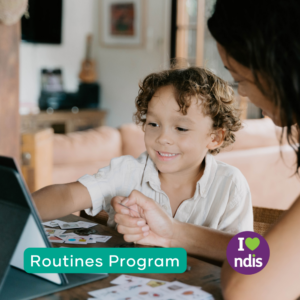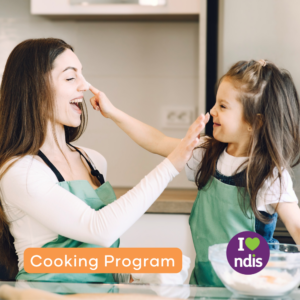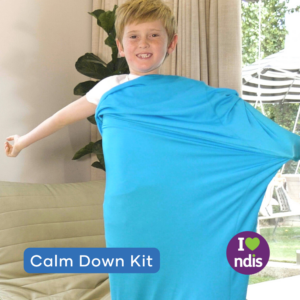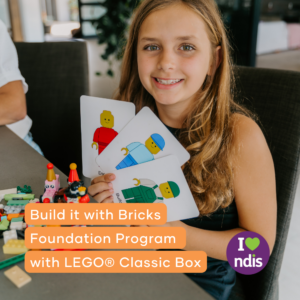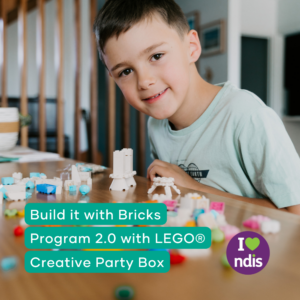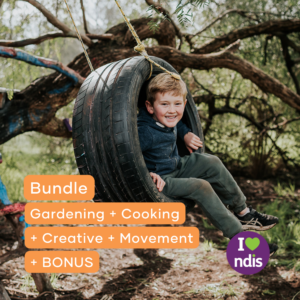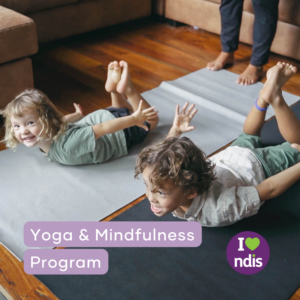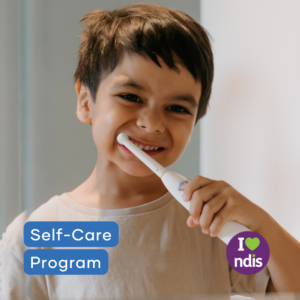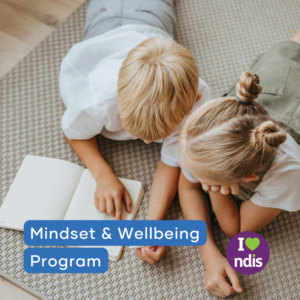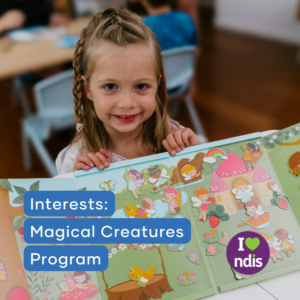Self-Care Program
$965.00
The Therapy at Home Self-Care Program has been designed by our team of occupational therapists to assist children in developing the skills they require to confidently manage the planning and execution of daily self-care routines.
Children will be supported to increase their understanding of self-care practices and encouraged to explore their sensory preferences. They will also be encouraged to learn, practise and play their way towards greater involvement and independence in their self-care tasks.
Created for ages 4 – 12 years old.
A block of Group Telehealth Sessions are included with this program.
- Description
- What's in the toolbox?
- What are the benefits?
- What are the goals?
- What skills will we build?
- Telehealth
- Outcome Report
The Therapy at Home Self-Care Program aims to support children in planning, sequencing, organising and executing self-care skills in the areas of dental care, hair care, bathing, showering and body care. Developed by paediatric therapists, it provides a range of guided demonstrations, education, tips and ways to play for fostering independence with these daily living skills.
Supported by over 40 videos, children will be guided to create their own unique self-care plan, with the opportunity to explore their personal sensory preferences. They will then learn about and practise self-care activities related to dental care, hair care, bathing, washing and body care through the guided demonstration videos.
In addition to the instructional videos, there are ideas for bringing a sense of play and fun into these self-care routines. The play ideas are offered as a way of supporting children to engage with self-care activities through play if they are not yet ready to participate with the guided demonstrations.
To accompany the content in the videos, children will be provided with a series of instruction cards that contain both written and visual cues to support the step-by-step execution of the self-care routines. There is also a facilitator guide that contains helpful training content and tips for the support person facilitating the program.
The toolbox has been carefully curated by our paediatric therapists to provide children with an extensive range of tools for engaging with and executing their self-care routines. The tools can be used in conjunction with the demonstrations in the online videos and allow children to explore their personal sensory preferences with a variety of self-care products.
Within the toolboxes you’ll find five interactive projects to build functional skills for independently managing and executing daily self-care tasks:
- Project 1: Setting up a daily self-care planner
- Project 2: Dental care
- Project 3: Hair care
- Project 4: Bathing or showering
- Project 5: Body care
Through skill development, participation, new knowledge and a range of practical tools, the Therapy at Home Self-Care Program aims to enhance children’s skills and engagement in daily self-care routines. In doing so, it seeks to create greater independence and enhanced confidence with these activities.
PLEASE NOTE:The essential components of the toolbox generally don’t change over time unless we are making improvements to the overall program. The specific tools included may differ at times in terms of brand, colour and other cosmetic differences due to sourcing factors out of our control. This will not affect the therapeutic benefits of the program as intended for the participant. We recommend that you only order one program per participant to ensure the appropriate use of funds. We cannot tailor toolboxes or programs to suit specific requests at this time. If you order a program for multiple participants they will receive the same program and toolbox. All shop listing images are representative of the program theme and not necessarily literal representations of what’s in the toolbox.
What's in the toolbox?
The Therapy at Home Self-Care Program comes with a toolbox of resources delivered to your door that aligns with the skill-building modules in the online program. This toolbox provides a practical and playful element that your child can engage with as they follow along with the videos.
The toolbox includes*:
✓ The Play Way’s Self-Care Buddy Magnetic Planner Set containing self-care visual magnets, magnetic whiteboard, timers, whiteboard markers and a Ways to Play Booklet to assist in developing a personal self-care planner
✓ Jack N’ Jill Bio Toothbrush, The Natural Family Co Toothbrush, Jack N’ Jill Buzzy Brush Musical Electric Toothbrush, Jack N’ Jill Silicone Finger Brush and Jack N’ Jill Tooth and Gum Brush to explore sensory preferences for dental care and to assist with motor planning
✓ Jack N’ Jill Flavor Free Toothpaste and Jack N’ Jill Natural Toothpaste Strawberry to accommodate for sensory sensitivities
✓ Jack N’ Jill Biodegradable Floss Picks to encourage participation in flossing and to support motor planning and fine motor skills required for this self-care task
✓ Jack N’ Jill Tooth Sparkles Tooth Cleaning Chews to explore supportive alternatives for cleaning teeth
✓ Natio Kids Detangling Spray, Hair and Body Wash, Bubble Bath and Body Lotion as paraben, sulphate and SLS-free options for self-care products
✓ Sensory hair brush as a gentle tool for hair care
✓ A variety of hair ties to trial and explore sensory preferences
✓ The Play Way’s Scalp Therapy Massager as a sensory tool for supporting a healthy scalp
✓ Natio Sunscreen and sunscreen applicator to provide a mess-free, sensory varied option for applying sunscreen
✓ The Adventures of Willy and his Sunburnt Bum! book to provide education and promote engagement with sun-safe practices
✓ The Play Way’s Bathroom Organiser and Mirror Set to assist with motor planning and body positioning in self-care activities
✓ Toiletry Organiser Sponge Bag to encourage organisation of self-care products and tools
✓ Soggy Doggy Game to promote a sense of fun and play with self-care routines
✓ The Play Way’s Lotion Guide Card Set containing life-like visual representations of a variety of lotions, along with a size comparison to common food items, to support independence with executing self-care routines
✓ Instruction cards with visual instructions to support children in completing their self-care routines at home
✓ Facilitator guide to assist in guiding and supporting the delivery of the therapy at home
* The essential components of the toolbox generally don’t change over time unless we are making improvements to the overall program. The specific tools included may differ at times in terms of brand, colour and other cosmetic differences due to sourcing factors out of our control. This will not affect the therapeutic benefits of the program as intended for the participant.
What are the benefits?
The Therapy at Home Self-Care Program aims to deliver the following benefits:
✓ Build self-confidence and autonomy in self-care tasks by developing an understanding of personal sensory preferences and creating a sensory safe space.
✓ Guide the development of fine motor skills in real-life contexts with the support of the guided demonstration videos and practical self-care tools.
✓ Support children to increase independence with executing their self-care routines through developing a self-care planner and tools to support personal organisation.
✓ Encourage the consolidation of healthy self-care habits by using the videos and tools to create safe spaces, practise skills and find individualised tools to meet self-care goals.
What are the goals?
The Therapy at Home Self-Care Program aims to achieve the following goals:
✓ Develop executive functioning related to self-care tasks including planning, organising and sequencing
✓ Improve body awareness
✓ Develop self-confidence and autonomy in performing self-care tasks
✓ Increase self-care engagement through managing sensory input and exploring sensory preference
✓ Improve motor planning ability, including task initiation (getting started), execution (putting the steps together and problem-solving) and following directions (listening and doing)
✓ Improve time management
✓ Develop healthy habits for daily living through self-care routines
✓ Increase awareness of self-care hygiene practices
✓ Improve fine motor skills through engaging in occupation-centred self-care tasks
View the Therapy at Home NDIS Goals Guide to see how the participant’s NDIS goals align with our range of Therapy at Home programs.
What skills will we build?
The Therapy at Home Self-Care Program focuses on skill development in the following areas:
✓ Fine motor skills through twisting, squeezing and pumping containers and tubes in real-life situations
✓ Gross motor skills as whole body movements are used to practise self-care tasks
✓ Language and communication skills through listening to instructions, receiving directions, collaborating with others, expressing ideas and preferences and clarifying messages
✓ Skills for planning, organising, sequencing and executing self-care tasks through the development of and engagement with a personal self-care planner
✓ Sensory regulation skills by learning about sensory processing and identifying and exploring personal sensory preferences related to self-care
✓ Skills for independence through the use of the self-care planner, guided demonstrations in the online videos and the written and visual prompts on the instruction cards
✓ Skills for daily living developed through step-by-step demonstrations and play, and motivated and encouraged by the resources in the toolbox
✓ Self-care skills in the areas of dental care, hair care, bathing, showering and body care
✓ Cognitive function skills through negotiating challenges related to developing and executing a daily self-care routine
✓ Self-confidence through independence in self-care activities and children acknowledging their sensory preferences
Telehealth
This program includes a block of Group Telehealth Sessions to support you in successfully implementing this program. To read more about the Group Telehealth inclusion please visit our FAQs.
Outcome Report
This program comes with an outcome report for NDIS review purposes.
Parents/guardians must submit online questionnaires measuring the child’s progress before and after the program as a requirement for obtaining the outcome report.
Find out more about how to use your NDIS funds for this program HERE



